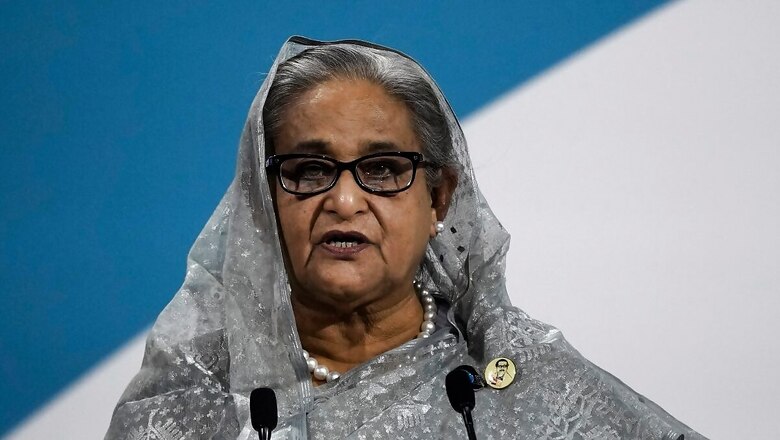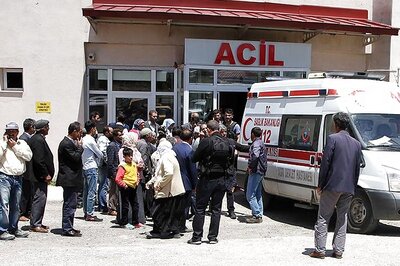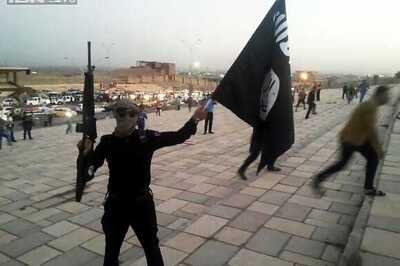
views
The recent incident in Bangladesh is truly alarming for the entire region. After Sri Lanka, it is the second country where the head of state had to flee the country due to violent protests. As a result, the former Prime Minister of Bangladesh has been granted the right to safe passage by India. From an international law perspective, two important questions arise: the first is the right of safe passage for political offenders, and the second concerns the provisions governing the formation of an interim government through a military takeover, which contains elements of both revolution and military coup.
Former Prime Minister Hasina’s departure is an example of India granting safe passage to a political asylee. There are many International Court of Justice judgements on the right to safe passage. The case of India v Portugal confirms that the right to safe passage is a part of customary international law. Various international treaties, regional agreements, and multilateral conventions confirm that the right to safe passage is both a treaty obligation and customary international law. Both sources of international law are outlined in Article 38 of the Statute of the International Court of Justice. The direct case that can be applicable here is the right to asylum case from the 1950s, as the facts of that case are very similar to the current incident.
On October 3, 1948, a military rebellion broke out in the South American state of Peru. However, the rebellion was quelled within a day, and the accused were arrested and charged. The day after the rebellion was suppressed, proceedings were instituted against Victor Raul Haye De La Torre, a leader of the Opposition party known as the American Citizens’ Revolutionary Alliance, on charges of instigating and directing the rebellion. Haye De La Torre evaded arrest and dodged Peruvian authorities, who were keen to bring him to trial. This pursuit was actively carried out by the military junta government that had emerged after the siege of Lima, the capital of Peru.
However, on January 4, 1949, Peruvian authorities were informed that Victor Raul Haye De La Torre had been granted asylum by the Colombian Mission in Lima. The Colombian ambassador subsequently requested that De La Torre be granted safe passage or a right of passage to leave the country. Peru solemnly refused, stating that De La Torre was accused of common crimes and thus did not qualify for the protection of political asylum. In other words, Peru rejected Colombia’s claim that De La Torre was a political refugee.
Soon, a diplomatic and political stalemate ensued between the two South American nation-states. After talks broke down in July, they eventually agreed to let the International Court of Justice be the arbiter. Diplomatic correspondence followed, culminating in the signing of an Act in Lima on August 31, 1949, by which the two governments agreed to submit the case to the International Court of Justice.
The Court stated that the leader had the right to safe passage, but a unilateral declaration of a political offender is not a regional custom. This case may offer guidance in the present situation. The Bangladeshi Prime Minister escaped to India, and India is prepared to grant safe passage for asylum under international law. Therefore, India is acting in accordance with international law. As there is no bilateral treaty between India and Bangladesh, India may freely recognise Hasina as a political asylum seeker.
Regarding the provisions governing coups, a coup is defined in international law as “the sudden, violent, and illegal seizure of power from the government,” whereas a revolution typically involves many individuals rallying with specific demands aimed at the authorities for implementation. The ongoing protests in Bangladesh should be viewed from the perspective of safeguarding the democratic process embraced by the populace, ensuring the election of regimes through unrestricted balloting—a principle expressly enshrined in the International Covenant on Civil and Political Rights.
In simple terms, democracy is about achieving a balance between dissent and agreement, not engaging in scorched-earth tactics against anyone who does not adhere to the orthodoxy of a particular political group. This concept of democracy is further supported by former United Nations Secretary-General Boutros Boutros-Ghali, who argued that “human rights, equal rights, and government under the law are important attributes of democracy.” It is the will of the people that should form the basis of governmental authority; this will should be expressed through periodic and genuine elections.
Going forward, from an international perspective, the United Nations should take on the responsibility, as it has done in the past in countries like Kosovo, to help establish a democratic structure in Bangladesh. The UN should lead and facilitate the development of an international instrument that specifically addresses the right to democracy as a human right.
Abhinav Mehrotra is Assistant Professor and Dr Biswanath Gupta is Associate Professor at OP Jindal Global University. Views expressed in the above piece are personal and solely those of the authors. They do not necessarily reflect News18’s views.




















Comments
0 comment